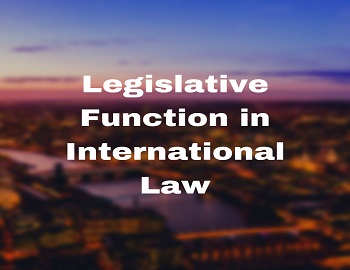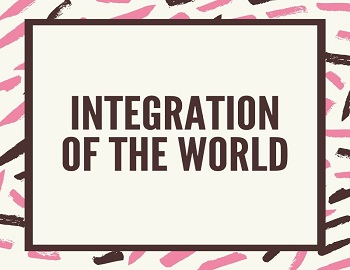Legislative Function in International Law:
It’s Decentralized Character- In all human communities enjoying government, the rules of law are created by centralized agencies- legislative bodies and courts. But in the international sphere no international body has ever been set up with a status comparable to that of national legislatures. As such the international legal system is essentially decentralized. In this system rules of international law generally rest on the assent of the states. States regard international rules as valid and binding only when these rules have been created by the mutual consent of individual states. This is true in most of the actions taken by specialized agencies of the United Nations. Some public international organizations may make exceptions to the rule of mutual consent, the exceptions are few and often relate to less significant matters.
How International Law is Made?
Since international law is decentralized in character: the question naturally arises as to how rules of international law are formulated. There are two main agencies by which these rules are made. These are (a) Customs and (b) Treaties.
Customs- Customary rules of international law have played the most significant part in building up the present system of international law. Customs are the rules that evolved after a long historical process which in due course find a place in their recognition by the international community. Although customs have lost much of their importance in recent times, they still play an important part in building up the present system of international law.
According to Schwarzenberger, international customary law, “is a source of international law only to the extent to which it is evidence of general practice accepted as law. It is not sufficient to show that states customarily do something or refrain from doing it. It is necessary to prove that they act in such a way because they admit a legal obligation to do so. In order to establish the existence of rules of international customary law, the student of international law is assisted by a growing body of decisions of international courts and tribunals and by abundant material to be found in diplomatic notes and other publicity available evidence of state practice”.
Customary law, however, is often difficult to prove. Generally, states do not agree among themselves as to the existence of customary law and it is often difficult to prove that a particular rule has been accepted by the community of nations. The rule must be provided by the presentation of evidence. The evidence generally comes from heterogeneous documents, state practice, state judicial decisions, diplomatic correspondence etc. No wonder, the International Law Commission of the United Nations was instructed in 1947 to “consider ways and means for making the evidence of customary law more readily available”.
According to Brierly, “The growth of a new custom is always a slow process and the character of international society makes it particularly so in the international sphere. The progress of the law, therefore, has come to be more and more bound up with that of law-treaties. But it is possible even today for a new custom to develop and to win acceptance as law when the need is sufficiently clear and urgent. A striking recent illustration of this is the rapid development of the principle of sovereignty over the air”.
Treaties- Because of the shortcomings of customary rules of international law as discussed above, states in recent times have turned to formulate new rules of international law through treatises. Treatises may be divided into two groups; law-making treatises and treaty-contracts. Law-making treaties lay down general rules binding on the states. Only law-making treaties are concerned with the development of international law and not the treaty-contracts which merely bind two or more states for some special object. The important examples of law-making treaties are the Treaty of Westphalia (1648), Treaty of Paris (1815), Treaty of Versailles (1919), Declaration of Paris (1856). The Geneva Conventions of 1864, 1906, 1929 and 1949, the Suez Canal Convention (1888), the two Hague Conventions of 1899 and 1907, the Covenant of the League of Nations (1920), the Kellogg Briand Pact (1928), the Charter of the United Nations (1945) etc.
An international treaty, however, creates international law only for those states which are parties to it. It will not bind states which are not parties to it. “Thus”, observes Brierly, “except in the almost impossible even of every state in the world becoming a party to one of these treaties, the law which it creates will not be law for every state”. According to Oppenheim universal international law is created when all members of the Family of Nations are parties to these treaties, e.g. the General Treaty for the Renunciation of August 27, 1928.
Shortcomings of Legislative Function of International law:
International Law from the legislative point of view suffers certain shortcomings which are discussed as under-
(1) Difficult to Interpret- It is argued that it is very difficult to interpret international legal documents. In the domestic society, this difficulty is solved by the legislative bodies themselves, which try to make rules as precise as they can, and by the courts which interpret the law and give it concrete meaning. But in the international field rules of international law are generally vague and ambiguous. The subjects of law have the supreme power not only to enact the rules for themselves but also to interpret and give concrete meaning to these rules. As such the subjects of law exploit every ambiguity and technicality for their own national interest. This has been true under the League and the U.N.O. Jean Ray well observed this situation when he remarked with regard to the Covenant of the League of Nations. “But the danger is obvious. If the members of the League as individuals have ultimate authority in matters of interpretation, divergent interpretations, all equally authoritative, are going to perpetuate themselves; and when ambiguous text is being invoked in a conflict between two nations there will be an impasse”.
(2) Not certain whether International Law is binding- Another weakness in the legislative function of international law is that it is not certain as to whether rules of international law are binding upon its subjects. In the domestic society, such a question could hardly arise. For an individual in domestic society is liable before the law of the state for its violation. In fact, the uncertain character of the rules of international law “shakes the very foundation of international law”.









Comments (No)